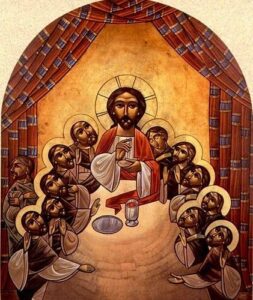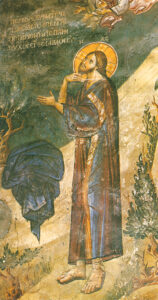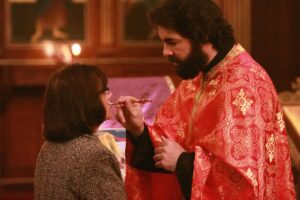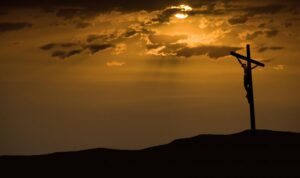Note that we’re still on our Holy Week “topsy-turvy” schedule, always “anticipating” the next appointed service. As I said, I don’t really understand why we do this. However somehow it feels just right for this Week when the whole world and all of history got turned upside down – even though the world didn’t know it yet.
Introduction
For most of our Orthodox history the Holy Wednesday night service was Matins/Orthros, which continues the Holy Week narrative. However, beginning a few hundred years ago in Greek and Antiochian churches *, Matins began to be replaced by the long service of Holy Unction – which as written requires seven priests and seven deacons, seven Epistle readings and seven Gospel readings and I don’t remember what all. (They were able to pull all that off at Aghia Sophia in Constantinople.)
- This is still uncommon in the Slavic tradition.
The Anointing was used as part of the preparation for Pascha Communion. In those days the Holy Eucharist was received rarely, for many people only at Pascha, and there was extensive preparation – strict fasting all week, Confession and Holy Unction. This is still the case in some places.
However, today Communions are far more frequent in many places, and Holy Unction is used regularly during the year for healing those who have serious illness, as it was originally intended. So why is Holy Wednesday Anointing still popular. Well… that’s hard to say. Nevertheless, especially in Greek churches people who almost never come to church will show up tonight. I remember assisting at one large local Greek parish where both late afternoon Orthros (with Anointing) and then also the evening Holy Unction service were filled to overflowing. (I don’t understand this. Can anyone here present explain it?)
Indeed liturgical scholars now recommend that we all have both Matins and the Holy Unction service tonight – which is a whole lot! I mean, well over three hours’ worth. There are various ways of dealing with this, especially in a small church with only one priest. Here at Saint Nicholas there’s no point in pretending we have seven deacons. (We don’t have even one at the moment.) I quite unofficially combined the two services, shortening both, so that all told we take about two hours. I understand there is now an official book containing a similar combination.
Matins Gospel: Luke 22:1-39
Jesus and the disciples are in the upper room at the house of John Mark’s mother – by tradition the Mark who later wrote the Gospel. Imagine having the Mystical Supper, the risen Lord’s Pascha night appearance and the descent of the Holy Spirit in your house!
Matthew, Mark and Luke all say this was the Passover meal. John says it was the night before the Passover – a mystery which I think has never been resolved.

In Luke Jesus says: “I have earnestly desired to eat this Passover with you before I suffer….I shall not eat it again till it is fulfilled in the Kingdom of God… I will not drink the fruit of the vine again till the Kingdom of God comes.” A shadow must have fallen over the meal which is usually a celebration. They all now knew what was coming so very soon, and they were not ready to face it.
The Institution of the Holy Eucharist
At the appointed time during the meal Jesus took the unleavened bread, and added puzzling words: “This is my Body given for you.” And at the end: “This is my Blood shed for you.”
What could this mean? Some Christians have given complex philosophical explanations. We Orthodox do not do that. It’s obvious there is no chemical change * in the Holy Gifts. Materially, they remain bread and wine. We simply accept what He said: “This is my Body… this is my Blood…”
- nor has any church or denomination ever officially taught this.
Dare I quote Queen Elizabeth I of England here? She may have had her theological failings, but I think she had this right: “Twas Christ the Word that spake it, The same took bread and brake it, And as the Word did make it, So I believe and take it.”
How odd that some Christians who try to take the entire Bible “literally” do not take this literally!
“Do this in remembrance of me” is a terrible translation. It suggests that Christ said “Do this to remind yourselves of my Body… my Blood”. Far from it! The word “Remembrance” comes from the Greek “anamnesis” / “ανάμνηση”, which in the New Testament means to “re-call, call to be present again.”
The text of the Liturgy in my Archdiocese (again an inadequate translation) goes on to say that we have “in remembrance, therefore, this saving commandment and all those things which have come to pass for us: the cross, the grave, the third-day resurrection, the ascension into heaven, the sitting at the right hand, and the second and glorious coming”. What this means in fact is that we call Christ to be present in all His fullness, in all He has done and is doing and ever will do for us.

The Holy Eucharist is the place our Lord Jesus Christ specifically appointed for us to meet Him and to feed on Him – gain Life from Him. “This is the bread that comes down from heaven, so that anyone may eat of it and not die. I am the living bread that came down from heaven. If anyone eats of this bread, he will live forever. And this bread, which I will give for the life of the world, is My flesh.” John 6:50-51
Here is my own simple, non-philosophical, non-dogmatic approach to the words “Body” and “Blood” – which I hope is not heretical, and if it is please tell me and I will recant. Our own bodies are the place where we are located, through which we act. Christ’s Body the Holy Eucharist is the place where He is, through which He acts for our salvation. Our blood is the source of our life, our strength. Just so, Christ’s Blood gives us His life, His strength for Eternal Life.
Christians, guided by the words of Saint Paul, would later emphasize that the Church also is the Body of Christ – that He meets us, comes to us, strengthens us through the holy People of God, both on earth and on high.
As indeed He does in all things if we only have eyes to see, for there is no place where Christ our God is not. This is why the Orthodox Church does not have “devotions to the Blessed Sacrament” as in traditional Western Christianity, focusing attention on the Eucharist itself. Let me try to say this carefully, so as not to mislead: In Orthodoxy we believe the Holy Eucharist exists to feed us with the Bread of Salvation, but not to draw us into the Sacrament itself. The Holy Eucharist is “outward directed”, so to speak. We find Christ’s Presence in the Eucharist, so that then He can begin to lead us out to find His Presence everywhere in all things – already waiting for us there.
by the choir of Saint Symeon’s Orthodox Church (OCA), Birmingham, Alabama (from “Orthodox Christian Chants” site)
The Narrative continues:

Judas now goes out to betray Him. Jesus again (lest they forget it) tells His apostles how to lead the Church – not by lording it over others but by serving them, leading them, just as He the Lord of all is servant of all, and will now lead our way through death into the Resurrection. He promises His Apostles that they will sit with Him at His table in His Kingdom on thrones judging the tribes of Israel. Tonight they will fail, but He looks beyond tonight. He knows they will again be faithful.
Simon Peter especially: Simon, Satan is out to get you. “No, Lord, I will go with you to prison and death”, as indeed He did in Rome 35 years later. But not tonight. Peter, before dawn you will deny me three times – and so discover how weak you are. (This is something we all need to discover.) Once I sent you all out with nothing, so you would learn to depend on God alone. But now you need provisions, a moneybag, a sword, “for now that which is written about Me comes to its conclusion”. He speaks in symbols. The disciples don’t understand: “Look, we have two swords.” Jesus said: “It is enough.”
Enough swords? No. That night Peter will use a sword, and Jesus will forbid it: “He who lives by the sword will die by the sword”.
Like all the others, they do not understand. So now He will show them. He leads them out to the Mount of Olives and into the Garden of Gethsemane.
In the next three days we will follow with Him, with them, through the final crucial events of Holy Week. (Do you know where the word “crucial” comes from?)
Holy Unction

I speak only for myself here. I try to make my Paschal Confession before Holy Wednesday, and get my sin out of the way. Then I find Holy Wednesday Unction meaningful – not as preparation to receive the Eucharist, which normally I do once a week and more, but primarily to “heal my sin-sick soul”, to open my inner eyes, to clear my foggy mind – so that I can enter into the wonderful events of these next three days with my whole being at peace and open to God, and truly live them with my Lord Jesus.
I suggest that before you are anointed on Holy Wednesday night you pray something like this: “Lord, open my eyes, my ears, my heart, and focus my wandering mind. Let me walk with you, fully alert, through Your Passion and Death and into Your holy Resurrection.”

The Next Post will arrive later today (Wednesday) for Holy Thursday Morning Vesperal Divine Liturgy of Saint Basil.
Hi!
My name is Luke and I have Asperger’s/autism. I have one question which I was wondering if you could say a virtual prayer for me for (typed). I have an action figure that I really like a lot and I was wondering if you could say a blessing/prayer that I can keep the action figure as mine in the resurrection and in the afterlife.
Sincerely and thank you,
Luke
Christ is risen! Truly He is risen!
Dear Luke:
Please forgive me. I’ve been so busy during Holy Week that I haven’t got around to answering your letter till this morning.
I don’t know exactly what we can take with us into Everlasting Life. I hope my little dog Vashti will be there. What we do know is that in Heaven God will heal us of all the things that trouble us, and things more wonderful that we can imagine will be there. As Saint Paul wrote, “No eye has seen, no ear has heard, and no human mind has conceived the things God has prepared for those who love Him”. Above all our Lord Jesus will be there.
So, Luke, I will pray as you ask. What you should do is pray honestly in your own words to God and ask Him what you want. No fancy words necessary. Just talk to Him as you did with me. And then trust Him. I hope you can take your action figure with you. If not, something infinitely more wonderful will be there.
with love in Christ,
Father Bill